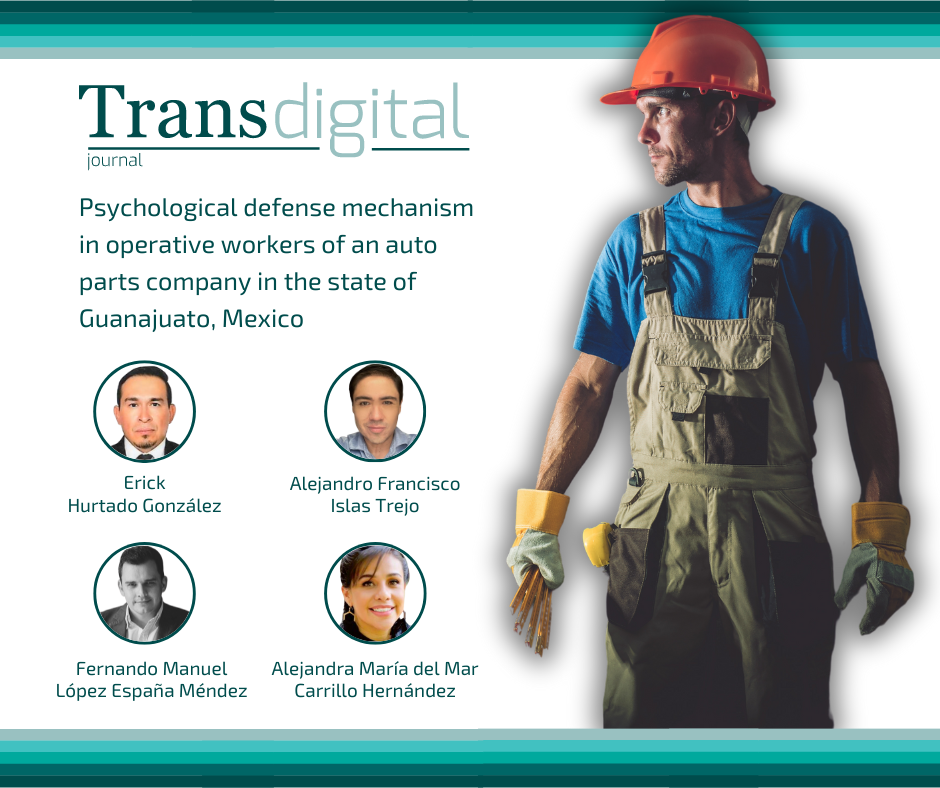Psychological defense mechanism in operative workers of an auto parts company in the state of Guanajuato, Mexico
DOI:
https://doi.org/10.56162/transdigital326Keywords:
Working conditions and enviroment, work, psychological defense mechanism, mental healthAbstract
Mental health problems at work are rising around the world, in tandem with changes in working conditions and environments. This instrumental case study examines the case of a company belonging to the automotive industry in the state of Guanajuato, Mexico. The Bajío region has become an important settlement for transnational assembly, auto parts and service companies. Effects were found of neutralizing the possibilities of actively participating in the improvement of working conditions and environment on relationships at work and risks associated with ergonomics. By living in isolation at work, operational workers build defenses to free themselves from it. In this case, the defense takes the form of rudeness in male workers, which can only be seen as a supposed exaltation of traditional masculinity, but which in the psychodynamic sense is presented as the need to hide the fear generated by the continuous confrontation with men risks arising from dangerous working conditions and environment.
References
Carrillo Pacheco, M. A., Martínez Juárez, J. J., & Lara Ovando, J. A. (2008). Los nuevos retos de la contratación colectiva. Universidad Autónoma de Querétaro / Plaza y Valdés editores.
Creswell, J. (2007). Qualitative Inquiry and Research Design: Choosing Among Five Approaches. Sage.
Dejours, C. (2019). Trabajar hoy: nuevas formas de sufrimiento y de acción colectiva. En M. Wlosko, & C. Ros (Coords.), (51-70). Universidad Nacional de Lanús.
Dejours, C. (1998). De la psicopatología a la psicodinámica del trabajo. En D. Dessors & M.-P. Guiho-Bailly, Organización del trabajo y salud: de la psicopatología a la psicodinámica del trabajo (23-73). Lumen/Humanitas.
Dejours, C., & Gernet, I. (2000). Psicopatología del trabajo. Miño y Dávila.
Galeano Marín, M. E. (2012). Estrategias de investigación social cualitativa. El giro de la mirada. La Carreta Editores.
Hernández Sampieri, R., Fernández Collado, C., & Baptista Lucio, P. (2014). Metodología de la investigación (6a. ed.). McGraw-Hill.
Hurtado González, E. (2023). Los factores y riesgos psicosociales en el trabajo como modeladores de la salud mental en una empresa de autopartes del Estado de Guanajuato [Tesis de doctorado, Universidad Autónoma de Querétaro]. Repositorio institucional de la Universidad Autónoma de Querétaro. https://ri-ng.uaq.mx/handle/123456789/9400
Leal, M. (2009). Estrés, calidad de vida y trabajo. En M. A. Carrillo (Coord.), Estudios sobre la Organización: Teoría y Práctica. Universidad Autónoma de Querétaro.
Neffa, J. C. (2017). La problemática de los riesgos psicosociales en el trabajo (Dossier). Revista Latinoamericana de Estudios del Trabajo, 35, 69-100. http://alast.info/relet/index.php/relet/article/view/263
Noriega, M., & Villegas, J. A. (1989). El trabajo, sus riesgos y la salud. En M. Noriega (Coord.) En defensa de la salud en el trabajo (pp. 5-12). Sindicato Independiente de Trabajadores de la Universidad Autónoma Metropolitana.
Plut, S. T. (2002). Nuevas perspectivas en psicopatología del trabajo. Revista Científica de UCES, 6(1), 122-143.
Taylor, S. J., & Bogdan, R. (1992). Introducción a los métodos cualitativos de investigación. Ediciones Paidós.
Universidad Católica Boliviana San Pablo Cochabamba, Bolivia. El estrés laboral como síntoma de una empresa (julio-diciembre, 2007). Revista Perspectivas, 20, 55-66.
Valles, M. S. (2000). Técnicas cualitativas de investigación social: reflexion metodológica y práctica profesional (1a. ed.). Síntesis.
Yin, R. K. (2009). Case study research: Design and methods (4th ed.). Sage.

Downloads
Autor de correspondencia
El autor de correspodencia se identifica con el siguiente símbolo: *Published
How to Cite
License
Copyright (c) 2024 Erick Hurtado González, Alejandro Francisco Islas Trejo, Fernando Manuel López España Méndez, Alejandra María del Mar Carrillo Hernández

This work is licensed under a Creative Commons Attribution 4.0 International License.
All articles in Transdigital are licensed under a Creative Commons Attribution 4.0 International License. Authors hold the copyright and retain publishing rights without restrictions.









